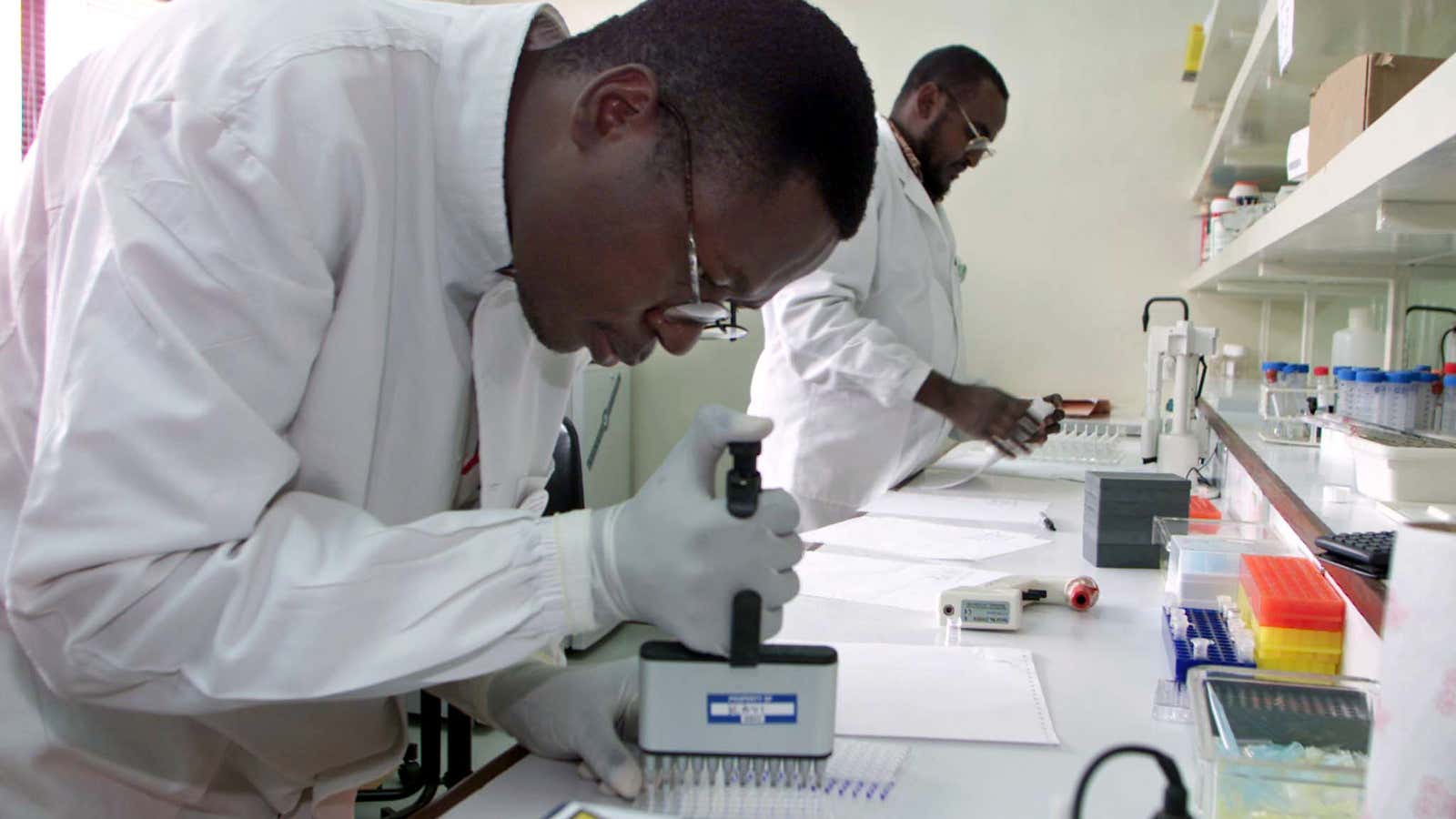In 2009, Tsige Gebre-Mariam, professor of pharmaceutics and drug delivery at Addis Ababa University was excited when he discovered a drug to expel worm-like parasites from the human body.
Besides the anti-parasitic drug, Gebre-Mariam also had a breakthrough in the treatments hemorrhoid and eczema and developed a formula from medicinal plants for the treatment of malaria. He had been working on it for 20 years. More than 213 million people were affected by malaria in Africa in 2018, with 380,000 deaths, according to WHO’s World Malaria Report 2019.
But after reaching out to the government and other funders to bankroll the project, he discovered financial support in his country and across continent was still reluctant to translate laboratory findings into locally relevant evidence. “Production in large scale requires substantial investment—cultivation of the plants, extraction facilities and standard production that meets good manufacturing standards,” Gebre-Mariam said, noting that setting up a factory is beyond researcher’s financial capacity. Since then, the discovered medicines have not reached any drug store, even in Addis Ababa.
Like the case of Gebre-Mariam, who also president of the Ethiopian Academy of Sciences, limited funding on research and development (R&D), is a challenge for scientists across Africa, significantly hampering innovation. The funding gap is glaring when the continent’s gross expenditure on R&D of circa 0.5% of GDP is compared to the global average of 2.2% and the OECD average of 2.3%.
Even though a few African countries are rising up to the challenge of spending on R&D, their efforts remain largely epileptic. Africa has fewer than 1% of patents on earth. This implies that their findings are hardly converted into workable solutions even when money is spent on research.
Against this backdrop, for decades now many African scientists have been forced to leave their home countries to work abroad where there is better funding. Even when they go overseas just for training, they are often reluctant to return home upon completion after working in well-equipped ultra-modern laboratories and in conducive environments.
Funding for scientists was at the top of the agenda at this year’s Grand Challenges forum for medical science researchers and policymakers in Addis Ababa, Ethiopia. The aim was to chart ways of accelerating the translation of innovation and address the continent’s most urgent health and development problems. During the discussions, the key issue which kept recurring was the lack of funding to take research findings off the shelf and into the marketplace for Africans and the rest of the world.
The African Union has said the right things but little impactful change has happened. In 2006, after recognizing the role of science and technology in increasing innovation, productivity and economic growth, African heads of state committed to raising their national gross expenditure on R&D to at least 1% of GDP by 2025. But the reality is that while a few countries including Malawi, Senegal, South Africa, Kenya and Ethiopia are making efforts to meet this modest target, the pledge on a continental scale has remained elusive.
The setback of scarce funding for R&D in Africa has been perennial. It is only gaining prominence now as there’s growing awareness and ambition for Africans to find solutions to African problems.
Financial Hiccups
“Our researchers don’t have the money,” says professor Sarah Mbi Enow Anyang Agbor, African Union commissioner for human resources, science and technology. But she said the continent could overcome this challenge by putting in place technology transfer offices in research institutes and universities which would link the private sector with researchers and their innovations. The hope is “that when they come out with their patents there are already industries which are ready to buy the research and make them into final products.”
Besides appealing for political will of African states, the AU Commissioner, urged commercial banks and the private sector to invest in the transformation of research findings.
To drive up sustainable research, there must be a sense of urgency for countries which are still lagging behind like Nigeria and Ghana, according to Felix Dapare Dakora, president of the African Academy of Sciences
Dakora posits a change of attitude from donor driven to personal ownership could help leverage concrete innovations in Africa. “The donors can help us to some extent but our governments have to stand up. It is not because our countries are poor, it’s because we don’t just have the vision and we don’t have that selflessness and leadership.”
Sign up to the Quartz Africa Weekly Brief here for news and analysis on African business, tech and innovation in your inbox
